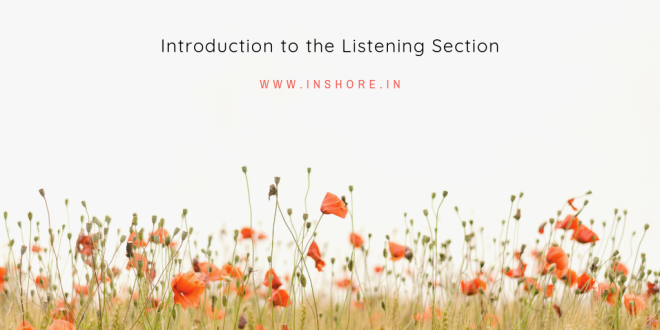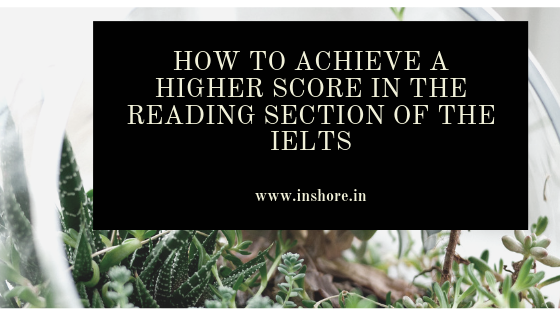
What is the Listening section?
Hello, everyone, I am Resham, and through this blog, I will be explaining to you the Listening section in detail, and of course, give you the answers to those two questions.
Before I take you further, I need you to ask yourself this – Is the kind of effort you are, or plan to put in to understand this section enough?
If the answer to that question is “No”, then this blog is for you
The very first step, before everything else is to prepare your mind for the many mistakes that you will make while attempting questions from this section. Do not expect yourself to come up with all the correct answers during the first few days. That is like seeking perfection and saying that exercise is too exhausting. To get results, you will need to endure failures, something that is an inevitable part of your learning process.
Once that is taken care of, the next step on path to a higher score is understanding various accents from around the world, such as – American, British, Canadian, Australian, and New Zealand. You will listen to variety of them in the audios and let me remind you that our Indian accent is very neutral compared to others, also, it takes a while to get used to the speed and the pronunciations as you attempt the questions. One of the easiest ways to counter this issue is to search online for various national radio stations of these countries, and try to listen to them. Keep this practice going for quite a while. You can take notes while listening to these, since that will help you increasing your handwriting speed.
The Listening Section consists of 4 audios – 40 questions, that need to be answered in a span of 30 minutes. I will now explain to you the audios and their nature in detail:
Audio 1 : The first audio will always have two speakers (a dialogue), with each of them giving you equal number of answers. We call this a social audio, because this contains a conversation about any social topic or everyday situations. For example, a person calling up the sports complex and inquiring about the various facilities
Audio 2 : The second audio will be a monologue, that is, only one person speaking. Also called a social audio. A typical example of this is a tour guide talking about some heritage site, a company or an organisation, etc.
Audio 3 : The third audio is a discussion between 2 or more speakers, typically about anything relating to academics, which is why the third audio is called an academic audio. Each speaker will have a different voice, and giving you equal number of answers. This one, however, will be tougher than the previous two audios, with answers coming at shorter, or longer intervals (when the students often start panicking, because the audio continues, and there is no answer for a while. Therefore it is important that you look for the keywords in the questions) Pay close attention to what you hear, which should always be your primary goal.
Audio 4 : The toughest of all is the fourth audio, a monologue, also called an academic audio, you will typically hear a professor delivering a lecture on an academically informative topic. The language, of course, just like other audios will be different from what you read in the questions. You will be listening to synonyms of the words used in the questions.
The duration of the Listening section is 40 minutes, that is, 30 minutes for the audios, and the remaining 10 minutes that are to used to transfer your answers to the main answer sheet. Download the PDF of the answer sheet used in the Listening section of the IELTS to use while preparing or this section, because you should be comfortable with all the aspects of the test before you take the test. It is imperative that you write the answers clearly because you need to ensure that the examiner understands your handwriting. Also, you cannot go wrong with the spelling. An incorrect spelling will lead to a loss of a mark. There are 40 questions in total, each worth one mark. This section requires you to multitask, that is – read the questions (for which you are given 30-45 seconds before the audio begins, use this time wisely since it will help you gather the context of the audio), listen to the audios carefully and then answer the questions (it is highly recommended that you write your answers on the question paper, for two reasons – a. shorthand is permitted, no one checks the question paper, thereby saving you time. b. it ensures that you do not make spelling mistakes while transferring your answers to the main answer sheet). The question paper is never checked, you can write down all the possible answers whenever faced with a dilemma, especially with the distractors, that when they give you two similar answers
The listening section is often the most favoured section, since one can easily score 39-40, given the right amount of practice and patience. Speaking of patience, you need to bear in mind that mistakes are an inevitable part of the learning process, and that they will lead you to identify a pattern. You need a keen eye to identify the kind of mistakes you are making. For example, I have often noticed students going wrong with the Labeling the Diagram, with following the directions and instructions simultaneously going massively wrong for them, which leads to losing interest. One advice that I’d like to give you here is to maintain a high level of patience. Spending time with the questions that you often make mistakes in will slowly but surely get the right answers. Read the questions carefully and listen to the audio multiple times till the point where you understand the reason behind the mistake you made. Its never the difficult part that interests you, its always the easy way that attracts you
There may be times when you will miss out on the answer while attempting the questions, in such situations, immediately move to the next question, because the audios are an ongoing process, and if you spent more than required time to answer a question, chances are that you will end up with a string of missed answers, which will ultimately impact the overall score too negatively. Enjoy the leverage of listening to the audios multiple times while you are preparing for the exam because getting used to the the speed of the speech and the pronunciations of words takes a while. Do not aim to understand the all that you hear, only filter the answers that you need to write, this is only possible when you have read the questions well, which is what we commonly call – Preparing the questions. Pick up the key words (as suggested earlier) that lead to the correct answer.
The kind of questions that you need to answer are:
- Forms/Notes/Flow-chart
- Sentence completion
- Match the following
- MCQs (Multiple choice questions)
- Labeling a diagram
- Short answer questions
One of the best features of the exam that works in the student’s favour – There is no negative marking! – Never leave a blank space. Always guess the answer…which brings us to a conclusion that listening to the information given in the audio is of paramount importance, that will give the correct answers in most of the cases.
I wish you all the very best, and hope that you find this blog useful
For one-on-one live training sessions with flexible timings, do get in touch at resham@inshore.in
Inshore
8851373199










